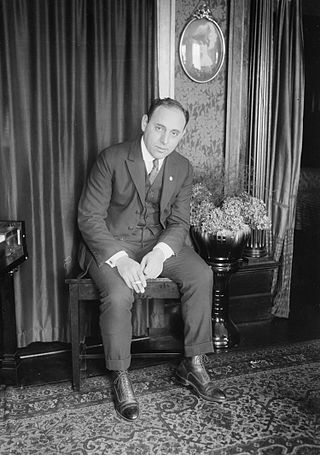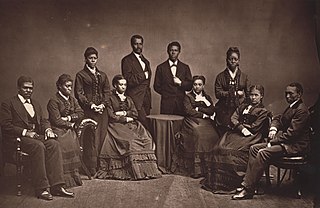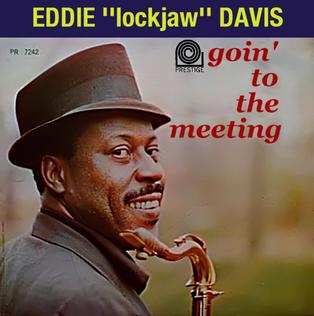Related Research Articles
This is a list of notable events in music that took place in the year 1909.
The Soul Stirrers were an American gospel music group, whose career spans over eighty years. The group was a pioneer in the development of the quartet style of gospel, and a major influence on soul, doo wop, and Motown, some of the secular music that owed much to gospel.
Spirituals is a genre of Christian music that is associated with Black Americans, which merged sub-Saharan African cultural heritage with the experiences of being held in bondage in slavery, at first during the transatlantic slave trade and for centuries afterwards, through the domestic slave trade. Spirituals encompass the "sing songs," work songs, and plantation songs that evolved into the blues and gospel songs in church. In the nineteenth century, the word "spirituals" referred to all these subcategories of folk songs. While they were often rooted in biblical stories, they also described the extreme hardships endured by African Americans who were enslaved from the 17th century until the 1860s, the emancipation altering mainly the nature of slavery for many. Many new derivative music genres emerged from the spirituals songcraft.

The ruby slippers are the magic pair of shoes worn by Dorothy Gale as played by Judy Garland in the 1939 Metro-Goldwyn-Mayer musical film The Wizard of Oz. Because of their iconic stature, the ruby slippers are among the most valuable items of film memorabilia. A number of pairs were made for the film, though the exact number is unknown. Five pairs are known to have survived; one pair was stolen from a museum in 2005 and recovered in 2018.

"Swing Low, Sweet Chariot" is an African-American spiritual song and one of the best-known Christian hymns. Originating in early oral and musical African-American traditions, the date it was composed is unknown. Performances by the Hampton Singers and the Fisk Jubilee Singers brought the song to the attention of wider audiences in the late 19th century. J. B. T. Marsh includes an early version of text and tune in his 1876 publication The Story of the Jubilee Singers, with their Songs. The earliest known recording of "Swing Low, Sweet Chariot" was taken in 1909, by the Fisk Jubilee Singers of Fisk University.

The Golden Gate Quartet is an American vocal group. It was formed in 1934 and, with changes in membership, remains active.

"Whole Lotta Shakin' Goin' On" is a song written by Dave "Curlee" Williams and sometimes also credited to James Faye "Roy" Hall. The song was first recorded by Big Maybelle, though the best-known version is the 1957 rock and roll/rockabilly version by Jerry Lee Lewis.

Arthur Fields was an American singer (baritone) and songwriter.

The Fisk Jubilee Singers are an African-American a cappella ensemble, consisting of students at Fisk University. The first group was organized in 1871 to tour and raise funds for college. Their early repertoire consisted mostly of traditional spirituals, but included some songs by Stephen Foster. The original group toured along the Underground Railroad path in the United States, as well as performing in England and Europe. Later 19th-century groups also toured in Europe.
"When the Saints Go Marching In", often referred to as simply "The Saints", is a black spiritual. It originated as a Christian hymn and is often played by jazz bands. This song was famously recorded on May 13, 1938, by Louis Armstrong and his orchestra.
"Oh, Dem Golden Slippers" is a minstrel song traditionally performed by blackface mummers in the United States. The song, penned by African-American James A. Bland in 1879, is particularly well known as a bluegrass instrumental standard.
"Oh, What a Beautiful Mornin'" is the opening song from the musical Oklahoma!, which premiered on Broadway in 1943. It was written by composer Richard Rodgers and lyricist/librettist Oscar Hammerstein II. The leading male character in Oklahoma!, Curly McLain, sings the song at the beginning of the first scene of the musical. The refrain runs: "Oh, what a beautiful mornin'! / Oh, what a beautiful day! / I've got a beautiful feelin' / Ev'rythin's goin' my way." Curly's "brimming optimism is perfectly captured by Rodgers' ebullient music and Hammerstein's buoyant pastoral lyrics."

"Wade in the Water" is an African American jubilee song, a spiritual—in reference to a genre of music "created and first sung by African Americans in slavery." The lyrics to "Wade in the Water" were first co-published in 1901 in New Jubilee Songs as Sung by the Fisk Jubilee Singers by Frederick J. Work and his brother, John Wesley Work Jr., an educator at the historically black college in Nashville, Tennessee, Fisk University. Work Jr. (1871–1925)—who is also known as John Work II—spent thirty years collecting, promoting, and reviving the songcraft of the original Fisk Jubilee Singers, which included being a member and director of the Fisk Jubilee Quartet. The Sunset Four Jubilee Singers made the first commercial recording of "Wade in the Water" in 1925—released by Paramount Records. W. E. B. Du Bois called this genre of songs the Sorrow Songs. "Wade in the Water" is associated with songs of the Underground Railroad.
Traditional Black gospel is music that is written to express either personal or a communal belief regarding African American Christian life, as well as to give a Christian alternative to mainstream secular music. It is a form of Christian music and a subgenre of Black gospel music.
The Midnight String Quartet were an easy listening chamber music quartet, consisting of two violins, a viola, and a cello, made up of students or graduates from the University of Southern California. They played covers and standards over several albums from 1966 to the early seventies, supplemented by a professional rhythm section, often including bass, drums and guitar and sometimes piano and harpsichord.
"Down by the Riverside" is an African-American spiritual. Its roots date back to before the American Civil War, though it was first published in 1918 in Plantation Melodies: A Collection of Modern, Popular and Old-time Negro-Songs of the Southland, Chicago, the Rodeheaver Company. The song has alternatively been known as "Ain' go'n' to study war no mo'", "Ain't Gwine to Study War No More", "Down by de Ribberside", "Going to Pull My War-Clothes" and "Study war no more". The song was first recorded by the Fisk University jubilee quartet in 1920, and there are at least 14 black gospel recordings before World War II.

Goin' to the Meeting is an album by saxophonist Eddie "Lockjaw" Davis recorded in 1962 for the Prestige label.

Ella Sheppard was an American soprano, pianist, composer, and arranger of Negro Spirituals. She was the matriarch of the original Fisk Jubilee Singers of Nashville, Tennessee. She also played the organ and the guitar. Sheppard was a friend and confidante of African-American activists and orators Booker T. Washington and Frederick Douglass.

Henrietta Crawley Myers, a.k.a. "Mrs. James A. Myers" was a singer (contralto) and choral director, primarily known for her work as director of the Fisk Jubilee Singers of Nashville, Tennessee.

Eloise Colcolough Uggams was an American soprano singer. She was a member of the Fisk Jubilee Singers, and appeared in Broadway musicals.
References
- ↑ "Library of Congress webpage with background on "Golden Slippers" and "Oh, Dem Golden Slippers". memory.loc.gov. Retrieved 2008-02-16.
- ↑ Goldsborough, Edmund K. (1900). Typical stanza lyrics, as listed in "Ole Mars An' Ole Miss" by Edmund K. Goldsborough, copyrighted 1900 . Retrieved 2008-02-16.
- ↑ ""Golden Slippers" recording by the Fisk Jubilee Singers (circa 1910), free-sample online access via Rhapsody.com". Rhapsody.com. Retrieved 2008-02-17.
- ↑ ""Golden Slippers" recording by the Fisk Jubilee Singers (1940), free-sample online access via Rhapsody.com". Rhapsody.com. Retrieved 2008-02-17.
- ↑ ""Golden Slippers" recording by the Golden Echo Quartet, free-sample online access via Rhapsody.com". Rhapsody.com. Retrieved 2008-02-17.
- ↑ ""Golden Slippers" recording by the Tuskegee Institute Singers, free-sample online access via Rhapsody.com". Rhapsody.com. Retrieved 2008-02-17.
- ↑ ""Golden Slippers" recording by Wood's Famous Blind Jubilee Singers & Cotton Belt Quartet, free-sample online access via Rhapsody.com". Rhapsody.com. Retrieved 2008-02-17.
- ↑ ""Golden Slippers" recording by the Wiseman Quartet, free-sample online access via Rhapsody.com". Rhapsody.com. Retrieved 2008-02-17.
- ↑ "Recording of "What Kind Of Shoes You Going To Wear" by William Rexroat and his Cedar Crest Singers (free sample by Rhapsody.com)". Rhapsody.com. Retrieved 2008-02-17.
- ↑ "Reworked lyrics, matching those of the Rexroat and Coltman recordings". lyrics007.com. Archived from the original on 2011-05-16. Retrieved 2008-02-16.